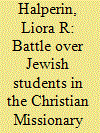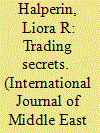| Srl | Item |
| 1 |
ID:
133528


|
|
|
|
|
| Publication |
2014.
|
| Summary/Abstract |
Studies of Jewish students in Palestine's Christian missionary schools largely end at the close of the Ottoman period. But although a tiny and diminishing fraction of Jewish students studied in such schools after the First World War, the mandate period was marked by anxious and often zealous Zionist anti-missionary campaigns. The article considers this space of Jewish-Christian interaction, arguing that even as a Hebrew-dominant society took root, missionary schools provided education in European languages, particularly English, tools that offered advantages to Jewish students with an interest in clerical work or foreign study. The continuing appeal and importance of foreign language skills cast doubt on the Zionist pretence of a self-sufficient Hebrew society.
|
|
|
|
|
|
|
|
|
|
|
|
|
|
|
|
| 2 |
ID:
164749


|
|
|
|
|
| Summary/Abstract |
Two Arabic-speaking Jewish guards worked in the European Jewish agricultural colony of Petah Tikva soon after its founding, northeast of Jaffa, in 1878: Daud abu Yusuf from Baghdad and Yaʿqub bin Maymun Zirmati, a Maghribi Jew from Jaffa. The two men, who worked as traders among Bedouin but were recruited for a short time by the colony, offer a rare glimpse of contacts between Ashkenazi and Middle Eastern Jews in rural Jewish colonies established in the last quarter of the 19th century, colonies that are often regarded as detached from their local and Ottoman landscape. The article first argues that Zionist sources constructed these two men as bridges to the East in their roles as teachers of Arabic and perceived sources of legitimization for the European Jewish settlement project. It then reads beyond the sparse details offered in Ashkenazi Zionist sources to resituate these men in their broad imperial and regional context and argue that, contrary to the local Zionist accounts, the colony was in fact likely to have been marginal to these men's commercial and personal lives.
|
|
|
|
|
|
|
|
|
|
|
|
|
|
|
|